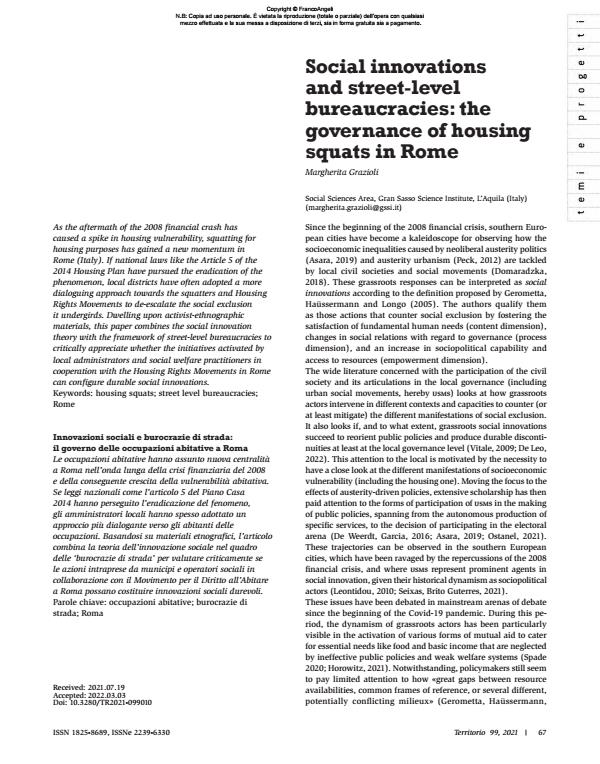Social innovations and street-level bureaucracies: the governance of housing squats in Rome
Titolo Rivista TERRITORIO
Autori/Curatori Margherita Grazioli
Anno di pubblicazione 2022 Fascicolo 2021/99
Lingua Inglese Numero pagine 6 P. 67-72 Dimensione file 134 KB
DOI 10.3280/TR2021-099010
Il DOI è il codice a barre della proprietà intellettuale: per saperne di più
clicca qui
Qui sotto puoi vedere in anteprima la prima pagina di questo articolo.
Se questo articolo ti interessa, lo puoi acquistare (e scaricare in formato pdf) seguendo le facili indicazioni per acquistare il download credit. Acquista Download Credits per scaricare questo Articolo in formato PDF

FrancoAngeli è membro della Publishers International Linking Association, Inc (PILA), associazione indipendente e non profit per facilitare (attraverso i servizi tecnologici implementati da CrossRef.org) l’accesso degli studiosi ai contenuti digitali nelle pubblicazioni professionali e scientifiche.
As the aftermath of the 2008 financial crash has caused a spike in housing vulnerability, squatting for housing purposes has gained a new momentum in Rome (Italy). If national laws like the Article 5 of the 2014 Housing Plan have pursued the eradication of the phenomenon, local districts have often adopted a more dialoguing approach towards the squatters and Housing Rights Movements to de-escalate the social exclusion it undergirds. Dwelling upon activist-ethnographic materials, this paper combines the social innovation theory with the framework of street-level bureaucracies to critically appreciate whether the initiatives activated by local administrators and social welfare practitioners in cooperation with the Housing Rights Movements in Rome can configure durable social innovations.
Le occupazioni abitative hanno assunto nuova centralità a Roma nell’onda lunga della crisi finanziaria del 2008 e della conseguente crescita della vulnerabilità abitativa. Se leggi nazionali come l’articolo 5 del Piano Casa 2014 hanno perseguito l’eradicazione del fenomeno, gli amministratori locali hanno spesso adottato un approccio più dialogante verso gli abitanti delle occupazioni. Basandosi su materiali etnografici, l’articolo combina la teoria dell’innovazione sociale nel quadro delle ‘burocrazie di strada’ per valutare criticamente se le azioni intraprese da municipi e operatori sociali in collaborazione con il Movimento per il Diritto all’Abitare a Roma possano costituire innovazioni sociali durevoli.
Parole chiave:occupazioni abitative; burocrazie di strada; Roma
- “Batti il 5!”: Grassroots Strategies Against the Administrative Invisibilization of Rome’s Housing Squatters Before and During the Pandemic Margherita Grazioli, in Radical Housing Journal /2022 pp.31
DOI: 10.54825/WQAH3246
Margherita Grazioli, Social innovations and street-level bureaucracies: the governance of housing squats in Rome in "TERRITORIO" 99/2021, pp 67-72, DOI: 10.3280/TR2021-099010